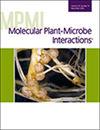求助PDF
{"title":"Exploration of the Interactions Between <i>Xanthomonas citri</i> subsp. <i>citri-Agrobacterium-</i>Citrus to Improve <i>Agrobacterium-</i>Mediated Transient Expression in Plants.","authors":"Tirtha Lamichhane, Hang Su, Xiaoen Huang, Nian Wang","doi":"10.1094/MPMI-12-24-0164-R","DOIUrl":null,"url":null,"abstract":"<p><p><i>Agrobacterium-</i>mediated transient expression (AMTE) is an important tool in plant genetics studies and biotechnology. AMTE remains problematic in citrus and many plant species. Previous research has shown that pretreatment of citrus leaves with <i>Xanthomonas citri</i> subsp. <i>citri</i> (<i>Xcc</i>), which causes citrus canker, significantly improves the AMTE efficacy. Here, we have shown that <i>Xcc</i> promotes AMTE mainly through triggering cell division and upregulating plant cell wall-degrading enzymes. We demonstrate that <i>Xcc</i> improves AMTE via PthA, a transcription activator-like effector known to trigger cell division in citrus, and mutation of <i>pthA4</i> abolished the promoting effect of <i>Xcc.</i> Mutation of the effector (PthA4)-binding element in the promoter region and coding region of <i>CsLOB1</i>, which is known to be directly activated by PthA4, significantly reduced <i>Xcc</i> promotion of AMTE. Mutation of <i>PthA4</i> significantly reduced the expression of cell division-related genes (<i>CDKA</i>, <i>CDKB1-2</i>, and <i>CDKB2-2</i>) compared with wild-type <i>Xcc</i> and the complemented strain. Cell division inhibitor mimosine but not colchicine also significantly decreased <i>Xcc</i> promotion of AMTE. In addition, PthA4 is known to upregulate plant growth hormones auxin (indole-3-acetic acid), gibberellin, and cytokinin, as well as cell wall-degrading enzymes (e.g., cellulase). Exogenous application of indole-3-acetic acid, cytokinin, and cellulase but not gibberellin significantly improved AMTE in leaves of sweet orange, pummelo, Meiwa kumquat, lucky bamboo, and rose mallow. Our study provides a mechanistic understanding of how <i>Xcc</i> promotes AMTE and develops practical measures to improve AMTE via pretreatment with plant hormones (i.e., auxin and cytokinin) and cellulase. [Formula: see text] Copyright © 2025 The Author(s). This is an open access article distributed under the CC BY-NC-ND 4.0 International license.</p>","PeriodicalId":19009,"journal":{"name":"Molecular Plant-microbe Interactions","volume":" ","pages":"479-488"},"PeriodicalIF":3.4000,"publicationDate":"2025-05-01","publicationTypes":"Journal Article","fieldsOfStudy":null,"isOpenAccess":false,"openAccessPdf":"","citationCount":"0","resultStr":null,"platform":"Semanticscholar","paperid":null,"PeriodicalName":"Molecular Plant-microbe Interactions","FirstCategoryId":"99","ListUrlMain":"https://doi.org/10.1094/MPMI-12-24-0164-R","RegionNum":3,"RegionCategory":"生物学","ArticlePicture":[],"TitleCN":null,"AbstractTextCN":null,"PMCID":null,"EPubDate":"2025/5/28 0:00:00","PubModel":"Epub","JCR":"Q2","JCRName":"BIOCHEMISTRY & MOLECULAR BIOLOGY","Score":null,"Total":0}
引用次数: 0
引用
批量引用
Abstract
Agrobacterium- mediated transient expression (AMTE) is an important tool in plant genetics studies and biotechnology. AMTE remains problematic in citrus and many plant species. Previous research has shown that pretreatment of citrus leaves with Xanthomonas citri subsp. citri (Xcc ), which causes citrus canker, significantly improves the AMTE efficacy. Here, we have shown that Xcc promotes AMTE mainly through triggering cell division and upregulating plant cell wall-degrading enzymes. We demonstrate that Xcc improves AMTE via PthA, a transcription activator-like effector known to trigger cell division in citrus, and mutation of pthA4 abolished the promoting effect of Xcc. Mutation of the effector (PthA4)-binding element in the promoter region and coding region of CsLOB1 , which is known to be directly activated by PthA4, significantly reduced Xcc promotion of AMTE. Mutation of PthA4 significantly reduced the expression of cell division-related genes (CDKA , CDKB1-2 , and CDKB2-2 ) compared with wild-type Xcc and the complemented strain. Cell division inhibitor mimosine but not colchicine also significantly decreased Xcc promotion of AMTE. In addition, PthA4 is known to upregulate plant growth hormones auxin (indole-3-acetic acid), gibberellin, and cytokinin, as well as cell wall-degrading enzymes (e.g., cellulase). Exogenous application of indole-3-acetic acid, cytokinin, and cellulase but not gibberellin significantly improved AMTE in leaves of sweet orange, pummelo, Meiwa kumquat, lucky bamboo, and rose mallow. Our study provides a mechanistic understanding of how Xcc promotes AMTE and develops practical measures to improve AMTE via pretreatment with plant hormones (i.e., auxin and cytokinin) and cellulase. [Formula: see text] Copyright © 2025 The Author(s). This is an open access article distributed under the CC BY-NC-ND 4.0 International license.
柑橘黄单胞菌亚种间相互作用的探讨。柑橘-农杆菌-柑橘提高农杆菌介导的植物瞬时表达。
农杆菌介导的瞬时表达(AMTE)是植物遗传学和生物技术研究的重要工具。AMTE在柑橘和许多植物物种中仍然存在问题。已有研究表明,柑橘黄单胞菌对柑橘叶片进行预处理。引起柑橘溃疡病的citri (Xcc)可显著提高AMTE的疗效。本研究表明,Xcc主要通过触发细胞分裂和上调植物细胞壁降解酶来促进AMTE。我们证明Xcc通过PthA改善AMTE, PthA是一种转录激活因子样效应物(TALE),已知可以触发柑橘的细胞分裂,pthA4的突变消除了Xcc的促进作用。已知可被PthA4直接激活的CsLOB1启动子区和编码区效应子(PthA4)结合元件(EBE)的突变,显著降低了Xcc对AMTE的促进作用。与野生型Xcc和补充菌株相比,PthA4突变显著降低了细胞分裂相关基因(CDKA、CDKB1-2和CDKB2-2)的表达。细胞分裂抑制剂氨莫辛而秋水仙碱也能显著降低Xcc对AMTE的促进作用。此外,已知PthA4上调植物生长激素生长素(IAA)、赤霉素和细胞分裂素,以及细胞壁降解酶(如纤维素酶)。外源施用IAA、细胞分裂素和纤维素酶可显著提高甜橙、蜜柚、梅花金桔、吉竹和玫瑰锦葵叶片的AMTE,而赤霉素不能显著提高。我们的研究提供了关于Xcc如何促进AMTE的机制理解,并开发了通过植物激素(即生长素和细胞分裂素)和纤维素酶预处理来改善AMTE的实际措施。
本文章由计算机程序翻译,如有差异,请以英文原文为准。

 求助内容:
求助内容: 应助结果提醒方式:
应助结果提醒方式:


